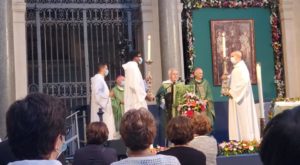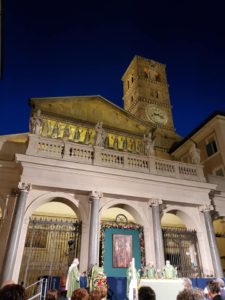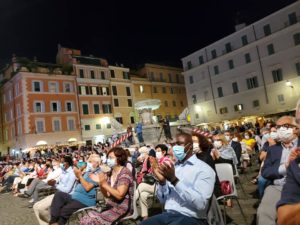«None of us initially knew who Sant’Egidio was. In the early years of the community, they often asked Andrea [Riccardi] what this Sant’Egidio had done that was so special that he chose to take his name! We found that he looks a lot like us…»
Cardinal Matteo Zuppi, affectionately still called Don Matteo by the Community, and currently Archbishop of the Italian city of Bologna, admitted this during his Sept. 1 homily for the 1300 year anniversary of the death of the saint, whose Community, now of global importance, bears his name.
With a full, and socially distant and sanitized crowd of faithful seated in the Piazza of Santa Maria of Trastevere, in front of the Church dedicated to the saint, the Cardinal, who was involved in the founding of the community, along with Andrea Riccardi, shed light on the identity of Sant’Egidio.
Sant’Egidio, abbot, was a hermit in the south of France. He became a very popular saint in the Middle Ages, although historical information regarding him is lacking. According to some historical sources, he was born in Athens in the early 7th Century and founded a monastery in Provence, near Arles. There, Egidio died.
The church named after him in the famous Roman district of Trastevere was the first place of prayer of the Community of Sant’Egidio, from which it took its name.
As explained on its website, the Community of Sant’Egidio, a lay Catholic association dedicated to social service, began in Rome in 1968, as the initiative of a young man, Andrea Riccardi, who at the time was then less than twenty. Inspired by the first Christian communities of the Acts of the Apostles and Francis of Assisi, Andrea believed that by reading and living the Gospel it would be possible to change the world. And so the Community started as a group of high school students who gathered to listen to and to put the Gospel into practice. Now active in nearly 80 countries, its president is Marco Impagliazzo.
«We live the memory of St. Egidio with particular joy,» Cardinal Zuppi began, recalling the important anniversary, marking 1300 years after the saint died and was buried in Southern France.
«It is a privileged occasion to give thanks,» the Archbishop of Bologna said, noting: «We should never miss any of these occasions to do so, because giving thanks helps us to live well, to remember the gifts we have and frees us from the temptation of being overtaken by worries, which makes us miss that which will not be taken away from us, and which makes us feel like victims, and hence not notice God’s closeness.»
Full but social distant & sanitized group of faithful ahead of the Mass of the Community of Sant'Egidio for the 1300-year commemoration of passing away of #SantEgidio. Archbishop of Bologna, #Cardinal #Zuppi, celebrating Mass @santegidionews (📸 Zenit's @DeborahLubov ) pic.twitter.com/QGgXOaPFo0
— ZenitEnglish (@zenitenglish) September 1, 2020
Sant’Egidio, he reminded, was considered protector of the weak, healer, defender of those who did not know how to defend themselves. He also protected those suffering, mentally and spiritually, of those who were shipwrecked, of those who were not masters of themselves, of farmers who invoke rain against drought.
Sant’Egidio, he underscored, «is a patron, that is, a protector, someone who thinks of me, who does not forget me, who takes me seriously and for whom I am so important, that he comes to my aid.»

«He continues to protect the ‘doe,’ a symbol of all the weak and of which he is a friend, from the violence and arrogance of all those who are masters of others and of the environment,» he noted, lamenting: «How many people do not have a patron to defend them!»
«We celebrate our patron with joy, we understand that we are and we choose to be him for others,» he said.
«We love Sant’Egidio, this home which is holy because it is a gift from God.»»
In these difficult months of the pandemic, full of loneliness and fear, Cardinal Zuppi noted, that the community’s members have understood even more the strength of humanity of Sant’Egidio and «how we cannot waste it with a love drained of passion or by keeping it for ourselves.» Cardinal Zuppi’s Archdiocese of Bologna lost numerous lives from COVID 19, as the region of Emilia Romagna was devestatingly hit by the virus.
Sant’Egidio, the Italian prelate also reminded, «lived in a world completely different from ours and we might think that it has nothing to do with our lives. Love always overcomes distances, time, differences, because it comes from God.»
«Holiness, that is, the love of God reflected in our humanity, never ends and lasts after us.
«Sant’Egidio certainly did not go around with a halo,» he added, «but certainly the others were looking for him because he was a man full of love, authoritative like Jesus because with his strength, the only one that really changes life, a power that does not retreat before the evil and who wins it.»
The Archbishop of Bologna noted how the saint conveyed a love that made him attractive and bright.
«He was a man of intense and persevering prayer and at the same time he welcomed every person with great sensitivity, especially the poor and those who needed protection. He was not afraid of the violent and the rich, on the contrary, if they met him, they understood and became different, because he was not presumptuous, he was humble and for this reason, full of the intelligence of God, weak, but full of the ‘power’ of love. He resisted their violence and defended the ‘doe,’ his friend. He built a monastery, that is, a community of people.»
«What a joy is such a saint and his name that unites us!» Cardinal Zuppi highlighted, saying: «His name makes the name of each one important and makes in each of us grow, even after many years, the desire to be better and the serene choice to bring out the best in us.» He also spoke of the saint’s many miracles.
«Another story speaks of Sant’Egidio as the one who laid the table on earth for the poor,» he said, «that Jesus lays for us in heaven. The name itself gives us company in our difficulties, makes us feel important because we are loved. It leaves us sometimes alone, but never isolated, as happens to some of our brothers who unfortunately live far away and in dangerous conditions.»
Moreover, the saint’s name inspires peace objectives, the cardinal stated, reminding: «How many invoke Sant’Egidio because they are submerged by the terrible storm of war!»
The Cardinal concluded, recalling the joy with which the community celebrates their patron, and encouraging them to keep trying to be Sant’Egidio for others, each in their own, little way.
Below is the full homily which Cardinal Zuppi provided to ZENIT, which has provided an unofficial working translation below:
***
We live the memory of St. Egidio with particular joy. Indeed, today we are celebrating a truly important anniversary: 1300 years after his death, which took place in the South of France, where he is buried. It is a privileged occasion to give thanks. We should never miss any of these occasions to do so, because giving thanks helps us to live well, to remember the gifts we have and frees us from the temptation of being overtaken by worries, which makes us miss that which will not be taken away from us, and which makes us feel like victims, and hence not notice God’s closeness. We give thanks for a gift that is ours and is personal, as the most intimate and precious thing that everyone has, and which helps us to make our neighbor precious, by loving him. It is a common gift, which makes us live in a single home with many interconnected rooms, even if far away. Despite our sin, we are His, because God is always greater than our misery. And «friendship here never ends,» said a longtime and visibly moved friend of the Community since it is God’s choice to be a friend. It is God who teaches us to be a family, to be one in all our choices, because friendship is the most important of all. Sant’Egidio is a home and not a headquarters. I was surprised (it struck me!), That just on the day of St. Egidio, a year ago, Pope Francis announced that he would make me a cardinal. It was clear: the community is eminent, what I have is for the love I have received and we are all owners of this house that unites us to the Bishop of Rome and to his presiding Church. In the small seed at the beginning, a large tree that Andrew saw even when it seemed impossible was hidden, because he believed that the Word is effective and we thank him with all our heart, together with Mark and all those who, as the Apostle would say, «work hard for us». We always pray for each other and also for those who have the service of communion in such a large, truly universal family and who ask us all to never fail in our friendship and closeness.
Sant’Egidio’s is a really great tree that wishes to offer shelter in a world marked by dark and powerful interests, which threaten it dangerously. It is a world crossed by so many pandemics to which the community has never got used, which it has not ignored and has not faced without haste, with the detachment of officials or with the coldness of the indifferent. With evil, there is no time to lose and Sant’Egidio has not stopped rushing to reach so many half-dead men who, if you waste time, lose even half of the life they had left, this time, out of the fault of the ‘bandit,’ who is indifference. In these difficult months, full of loneliness and fear, we have understood even more the strength of humanity of Sant’Egidio and how we cannot waste it with a love drained of passion or by keeping it for ourselves.
Sant’Egidio lived in a world completely different from ours and we might think that it has nothing to do with our lives. Love always overcomes distances, time, differences, because it comes from God. Holiness, that is, the love of God reflected in our humanity, never ends and lasts after us. Sant’Egidio certainly did not go around with a halo, but certainly the others were looking for him because he was a man full of love, authoritative like Jesus because with his strength, the only one that really changes life, a power that does not retreat before the evil and who wins it. He conveyed a love that made him attractive and bright. He was a Greek who took the Gospel seriously and felt at home everywhere, like the Community. He went to the other side of the world at the time, France and Spain. He was a rich man who became poor because he had found everything. He was a man of intense and persevering prayer and at the same time he welcomed every person with great sensitivity, especially the poor and those who needed protection. He was not afraid of the violent and the rich, on the contrary, if they met him, they understood and became different, because he was not presumptuous, he was humble and for this reason, full of the intelligence of God, weak, but full of the «power» of love. He resisted their violence and defended the ‘doe,’ his friend. He built a monastery, that is, a community of people.
None of us initially knew who Sant’Egidio was. In the early years of the community, they often asked Andrea [Riccardi] what this Sant’Egidio had done that was so special that he chose to take his name! We found that he looks a lot like us! Those who love the Lord do not become the same as others, but discover that we are brothers and that it is beautiful to be. They understand that we are children of the same mother and experience the joy of being together: poor and rich, men and women, sick and not, young and old, children and adolescents. We can all listen to Him and this helps us put this into practice, as we learn that each of us always has something to give to others.
What a joy is such a saint and his name that unites us! His name makes the name of each one important and makes in each of us grow, even after many years, the desire to be better and the serene choice to bring out the best in us. Sant’Egidio was one who performed many miracles. God’s Word is effective and life changing! And it teaches us to do the great things of the disciples of Jesus, who cannot be satisfied with a mediocre love, because love is not mediocre. They tell the ancient stories of people who were in great difficulty, such as prisoners or those sentenced to death, who pronounced the name of Sant’Egidio and were freed or protected. Another story speaks of Sant’Egidio as the one who laid the table on earth for the poor that Jesus lays for us in heaven. The name itself gives us company in our difficulties, makes us feel important because we are loved. It leaves us sometimes alone, but never isolated, as happens to some of our brothers who unfortunately live far away and in dangerous conditions. It is a name that inspires peace objectives. How many invoke Sant’Egidio because they are submerged by the terrible storm of war!
The Gospel we have heard speaks to us of a man who was no longer in control of himself because he was possessed by a spirit that ruined his heart and his relationship with others. Jesus repairs and does not ruin, heals but does not condemn, silences division and builds a relationship of love, restores us to ourselves and to others, gives us the power to free the world from so many spirits of division, hatred, violence, of loneliness. Sant’Egidio was considered protector of the weak, healer, defender of those who did not know how to defend themselves. He also protected those suffering, mentally and spiritually, of those who were shipwrecked, of those who were not masters of themselves, of farmers who invoke rain against drought.
Sant’Egidio is a patron, that is, a protector, someone who thinks of me, who does not forget me, who takes me seriously and for whom I am so important, that he comes to my aid.
He continues to protect the doe, a symbol of all the weak and of which he is a friend, from the violence and arrogance of all those people who are masters of others and of the environment. How many people do not have a patron to defend them! We celebrate our patron with joy, we understand that we are and we choose to be him for others. We love Sant’Egidio, this home which is holy because it is a gift from God.
“The Lord is good towards everyone; His tenderness extends to all creatures. All Your works praise You, Lord, and Your faithful ones bless you. Let them speak of the glory of Your Kingdom and Speak of Your power. To make known to men Your deeds and the splendid glory of Your kingdom”.
[Unofficial Text Provided to and Translated by Zenit Sr. Vatican Correspondent, Deborah Lubov]


